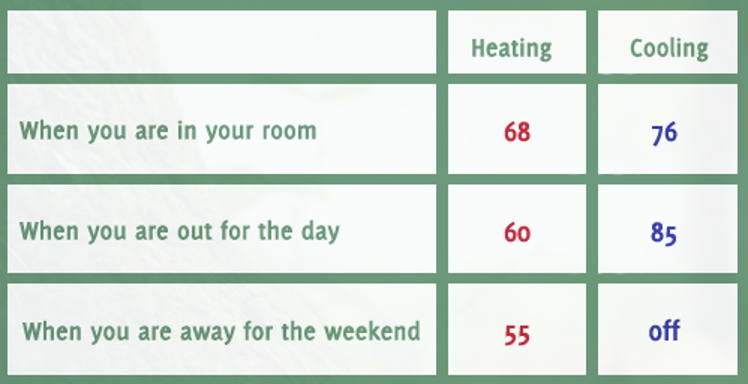
Resources
Sustainability
Residential Services is fully engaged in supporting Penn’s mission to increase awareness of waste reduction, energy conservation, and best practices for living a sustainable lifestyle at Penn. Here are some ways that residents can lighten their environmental impact.
Quick Tip
Want to learn more about sustainable practices? Check out the Penn Sustainability website, and follow Penn Sustainability on Facebook, Twitter, and Instagram.
If you are already doing some of the practices listed on this page, check out Penn’s Green Living Certification to get recognized for your actions!
In October of 2019, Penn announced the release of its Climate and Sustainability Action Plan 3.0 (CSAP 3.0). Check out the full plan here to see how you can get involved.
- Know what can be recycled on campus and where to recycle it!
- Establish a waste reduction ethic — minimize unnecessary copying, reuse scrap paper and envelopes, print double-sided, etc.
- Avoid purchasing products that are heavily packaged; when packaging isn’t avoidable, know how to properly dispose of it!
- Support the PennMOVES charity drive instead of trashing unwanted items when you move out
- Purchase green products when possible, including products with high recycled content, bio-based cleaning products, and local or certified products.
- Use compact fluorescent light bulbs (CFLs) or LED bulbs — they use up to 70% less energy than a traditional incandescent bulb.
- During the daytime, use natural lighting when possible - open your blinds to brighten up the room. During the night, close your blinds or curtains to keep heat or cool air in your room.
- TURN OFF THE LIGHTS when you're not using them — especially in places like closets and hallways where you only need the light momentarily.
- Turn off your computer, lights, TV, and other appliances when not in use.
- Unplug adapters (like your cell phone and laptop chargers) when not in use, as the charger will use energy 24/7, even when your item is not connected + charging.
- Use a power strip for multiple items (like an entertainment system), and turn the power strip off when it is not in use.
- Save energy by enabling your computer's energy-saving features. Always turn your computer off if you will not be using it within the next hour.
- If you have control over your thermostat, set the AC and heat to reasonable temperatures. Better yet, turn them off! A list of recommended temperatures are below.

- Refill personal water bottles with tap water.
- Match the size of the pan to the heating element. Using a 6-inch pan on an 8-inch burner wastes more than 40% of the burner's heat.
- Use a slightly curved cooking pan, which distributes heat more evenly than a flat-bottomed pan. Copper bottomed pans heat faster than conventional cookware.
- Turn your refrigerator temperature down (while retaining a healthy level). Most refrigerators are set at a temperature that is unnecessarily cold, resulting in accidentally almost-frozen food.
- Keep the cooling coil on the back of your refrigerator free of dust to allow it to operate more efficiently.
- Turn off the faucet while you are brushing your teeth. Water that runs straight to the drain is 100% waste.
- Take shorter showers and don't leave the water running when you're not using it. College House bathrooms have been equipped with water-saving showerheads. The overall impact for Penn is a significant conservation in water.
- To get the best performance, the showerhead should be positioned to point in a straight line from the stem. Don’t angle the showerhead or try to direct it otherwise because it will lessen the volume and force of the shower.
- To get the best performance from the new toilets, use the softer style bathroom tissue or use single-ply tissue. Both dissolve in water more readily. Don’t flush anything down the toilet besides human waste and toilet paper.
- Toilets which have been replaced through renovations are also water saving. If necessary, flush twice!
- Report leaks or faucets that won’t turn off to Facilities by entering an AiM maintenance request through the Penn Portal, or call Facilities Work Control at 215-898-7208 to report a maintenance problem.
- Use cold water for the wash cycle (instead of hot) when you do your laundry, and always rinse in cold water. Colder water also ensures your fabric colors will not run!
- Only do laundry when you have a full load. Running machines half full uses just as much water and energy as a full load.
- Consider using a clothing rack or hangers to air-dry your laundry inside your College House instead of using the dryer. This will save energy and help your clothing last longer!
- More information about getting around campus and the city: www.upenn.edu/transportation
- An updated list of Philly area bike lanes: https://bicyclecoalition.org/resources/bike-maps/
- Philly area bike share program: www.rideindego.com
- Information about public transportation, including buses, trolleys, and regional rail: www.septa.com
- For longer train trips: www.amtrak.com
- Support local organic farms, including the farmers market that visits campus: https://www.universitycity.org/farmersmarkets
- Minimize the use of disposable dishware
- Carry reusable silverware with you to cut down on single-use plastic usage
- Utilize a reusable mug and/or drinking bottle
- Avoid wasting food; take home leftovers whenever possible
- Take reusable shopping bags along when you go to the market
- Refuse bags for small purchases if they can be easily carried
- Consider eating less meat and increasing your amount of plant-based meals